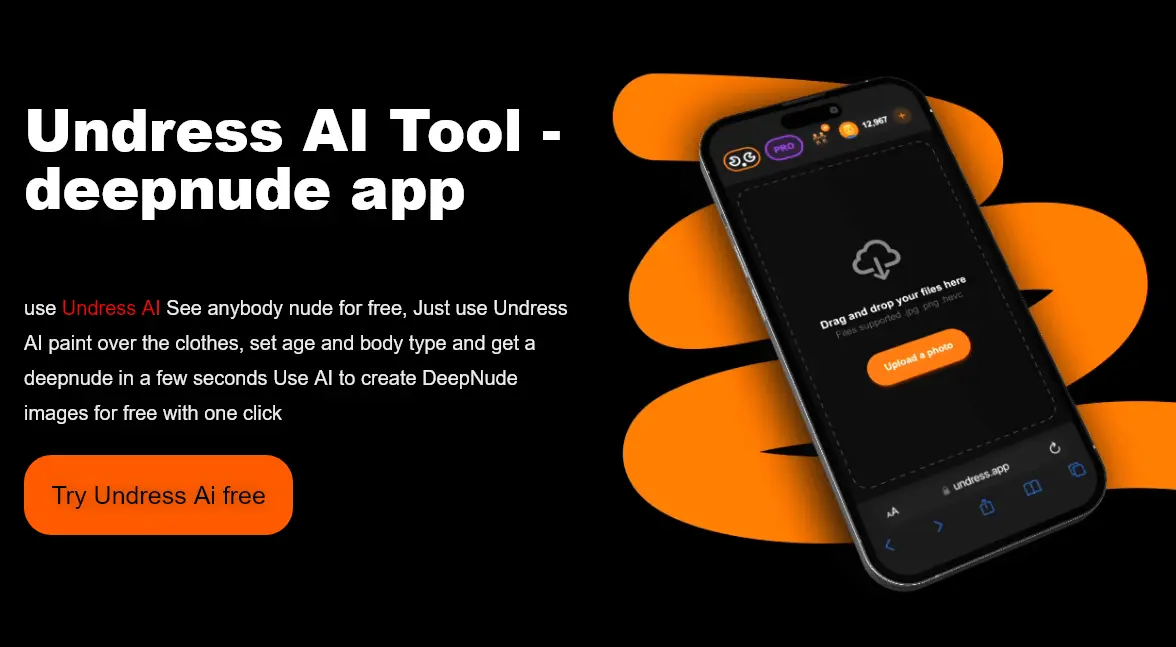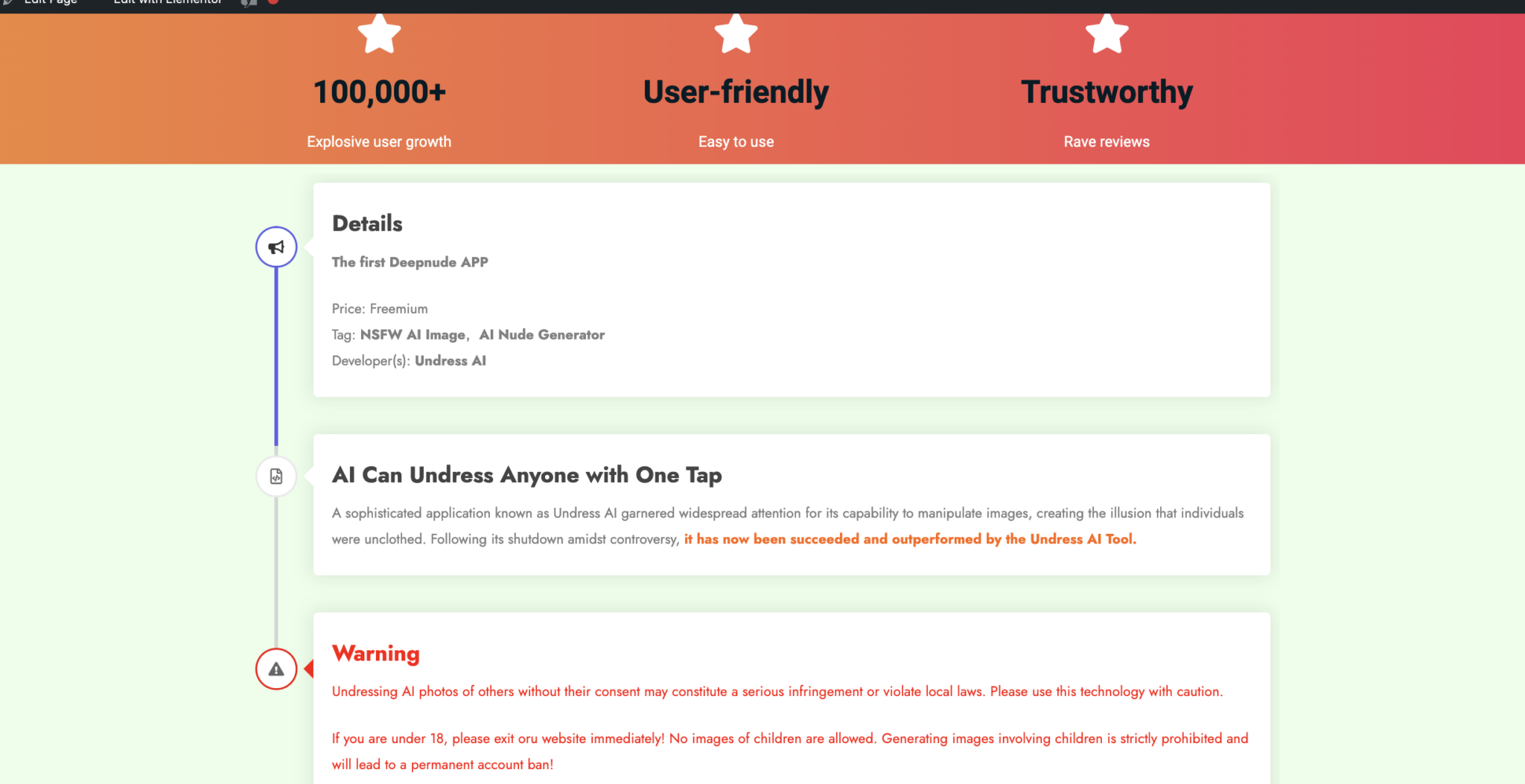Have you ever wondered if technology could go too far, blurring the lines of ethics and privacy? The emergence of undressaitool.ai/ raises profound questions about the potential for AI to be misused, prompting a critical examination of its implications for society.
The internet is abuzz with both excitement and apprehension regarding undressaitool.ai/. This AI-driven platform claims to be capable of digitally altering images, specifically with the purported function of removing clothing. The technology ostensibly leverages advanced deep learning algorithms to reconstruct the image underneath the removed garments, generating what it presents as a realistic depiction. While the creators may argue about artistic or creative applications, the tool's potential for misuse is undeniable and warrants serious discussion.
The primary concern revolves around non-consensual image manipulation. Imagine a scenario where someone's photo, perhaps innocently posted on social media, is fed into undressaitool.ai/. The tool then generates an altered version of the image, stripping away clothing and creating a false and potentially damaging representation. This could lead to severe emotional distress, reputational harm, and even legal repercussions for the victim. The ease with which such manipulations can be carried out, coupled with the difficulty of tracing the source and the rapid spread of misinformation online, makes this a particularly alarming prospect.
- Movierulz Latest Movie Reviews News More Year Find Out
- Where To Watch Find Streaming Options In India More
Furthermore, the existence of undressaitool.ai/ raises serious ethical questions for AI developers. What responsibility do they bear for the potential misuse of their technology? Should there be stricter regulations governing the development and deployment of AI tools that can manipulate images in such a sensitive way? The current legal framework often lags behind technological advancements, leaving a gray area where harmful applications can flourish. Finding a balance between fostering innovation and protecting individuals from harm is a complex challenge that requires careful consideration by lawmakers, ethicists, and the tech industry itself.
The implications extend beyond individual harm. Such tools could be used to create fake evidence in legal proceedings, spread malicious rumors about public figures, or even fuel online harassment campaigns. The ability to generate convincing, yet entirely fabricated, images erodes trust in visual media and makes it increasingly difficult to distinguish between reality and fiction. This has a chilling effect on freedom of expression and open discourse, as individuals may become hesitant to share images online for fear of being targeted by such manipulative technologies.
The debate surrounding undressaitool.ai/ is not simply about the tool itself, but about the broader ethical landscape of AI development. As AI becomes more powerful and pervasive, it is crucial to address the potential for misuse and establish clear ethical guidelines. This includes investing in research to detect and counteract manipulated images, educating the public about the dangers of AI-generated misinformation, and holding developers accountable for the harmful applications of their technology. The future of AI depends on our ability to harness its power responsibly and ensure that it serves humanity, not the other way around.
One of the most insidious aspects of undressaitool.ai/ is its potential to normalize the non-consensual sexualization of individuals. By making it easy to "undress" anyone in a digital image, the tool contributes to a culture where people are viewed as objects to be manipulated and exploited. This is particularly concerning for women and girls, who are already disproportionately targeted by online harassment and abuse. The existence of such tools perpetuates harmful stereotypes and reinforces the idea that women's bodies are public property, subject to the gaze and manipulation of others.
Moreover, the technology underlying undressaitool.ai/ raises questions about the biases inherent in AI algorithms. AI systems are trained on vast datasets of images, and if these datasets reflect existing societal biases, the AI will likely perpetuate them. In the case of image manipulation tools, this could mean that the AI is more likely to "undress" images of women than men, or to generate images that conform to unrealistic and harmful beauty standards. Addressing these biases is crucial to ensure that AI technologies are used in a fair and equitable manner.
The legal landscape surrounding image manipulation is complex and varies depending on jurisdiction. In some countries, it may be illegal to create and distribute manipulated images that are defamatory, obscene, or violate someone's privacy rights. However, proving these violations can be challenging, particularly if the image is widely disseminated online and the source is difficult to trace. Furthermore, the legal framework may not adequately address the emotional distress and reputational harm caused by non-consensual image manipulation, even if it does not meet the strict legal definitions of defamation or obscenity.
Beyond legal remedies, there is a growing need for technological solutions to combat the spread of manipulated images. Researchers are developing AI algorithms that can detect subtle inconsistencies in images that may indicate manipulation. These tools could be used to flag potentially fake images on social media platforms, warn users before they share manipulated content, and even trace the origin of the image. However, the arms race between image manipulation and detection is ongoing, and it is crucial to invest in continued research to stay ahead of the curve.
The discussion surrounding undressaitool.ai/ highlights the urgent need for a broader societal conversation about the ethics of AI. As AI becomes increasingly integrated into our lives, it is essential to establish clear ethical guidelines and regulations to prevent its misuse. This requires collaboration between policymakers, technologists, ethicists, and the public to ensure that AI is used in a way that benefits society as a whole. Failure to address these ethical challenges could lead to a future where trust is eroded, privacy is violated, and the line between reality and fiction becomes increasingly blurred.
The debate about undressaitool.ai/ isn't just about a single piece of software; it's a microcosm of a much larger issue: the potential for AI to be weaponized against individuals and society as a whole. While proponents of such technologies often tout their potential for creative expression or artistic exploration, the reality is that their misuse far outweighs any potential benefits. The ease with which these tools can be used to create deeply offensive and damaging content necessitates a proactive and multifaceted approach to regulation, education, and technological countermeasure.
Consider the psychological impact on victims of non-consensual image manipulation. The feeling of violation, the loss of control over one's own image, and the potential for widespread dissemination of the altered image can be devastating. This is not simply a matter of hurt feelings; it can lead to anxiety, depression, social isolation, and even suicidal ideation. The long-term consequences for victims can be profound and require access to mental health support and resources.
Furthermore, the proliferation of these tools has a chilling effect on freedom of expression. Women, in particular, may be less likely to share photos online, participate in online discussions, or express themselves freely for fear of being targeted by image manipulation. This creates a climate of self-censorship and undermines the principles of equality and inclusivity that are essential to a healthy society.
The response to undressaitool.ai/ cannot be solely reactive. We need to proactively address the underlying factors that contribute to its creation and use. This includes challenging harmful stereotypes about gender and sexuality, promoting media literacy and critical thinking skills, and fostering a culture of respect and consent online. Education is key to preventing the misuse of these technologies and creating a more ethical and responsible digital environment.
In addition to legal and technological solutions, we need to foster a culture of ethical AI development. This means prioritizing privacy, transparency, and accountability in the design and deployment of AI systems. Developers should be required to conduct thorough risk assessments to identify potential harms and implement safeguards to mitigate those risks. Independent audits and oversight mechanisms can help ensure that AI systems are used in a responsible and ethical manner.
The conversation surrounding undressaitool.ai/ serves as a wake-up call. It reminds us that technology is not neutral and that its impact on society depends on the choices we make. We have a responsibility to ensure that AI is used in a way that promotes human dignity, protects privacy, and fosters a more just and equitable world. This requires a collective effort from policymakers, technologists, educators, and the public to shape the future of AI in a way that reflects our shared values.
Ultimately, the challenge posed by undressaitool.ai/ is not just about technology; it's about humanity. It's about our ability to use our collective intelligence and moral compass to navigate the complex ethical landscape of the digital age and create a future where technology serves to empower and uplift, rather than exploit and dehumanize.
| Undressaitool.ai - Ethical Concerns | |
|---|---|
| Category | Information |
| Type | AI-powered Image Manipulation Tool |
| Primary Function | Purported removal of clothing from digital images |
| Ethical Concerns |
|
| Potential Impacts |
|
| Mitigation Strategies |
|
| Developer Responsibility | Accountability for potential misuse, risk assessment, ethical design principles |
| Related Issues | Deepfakes, image-based sexual abuse, online privacy |
| Reference: Electronic Frontier Foundation (EFF) |



Detail Author:
- Name : Mariah Hauck
- Username : ktorphy
- Email : marcellus.kozey@flatley.com
- Birthdate : 2001-01-24
- Address : 5953 Esther Drive Karafurt, KS 97070
- Phone : +1.219.544.6116
- Company : Reynolds Inc
- Job : Singer
- Bio : Vel libero itaque ut aperiam eum. Quisquam eum praesentium adipisci praesentium. Labore dicta debitis ea omnis.
Socials
linkedin:
- url : https://linkedin.com/in/loishauck
- username : loishauck
- bio : Eos deserunt adipisci doloremque omnis.
- followers : 4182
- following : 1793
instagram:
- url : https://instagram.com/lois.hauck
- username : lois.hauck
- bio : Maiores non laboriosam vel eligendi. Sunt sapiente explicabo corporis ea suscipit.
- followers : 5802
- following : 1739